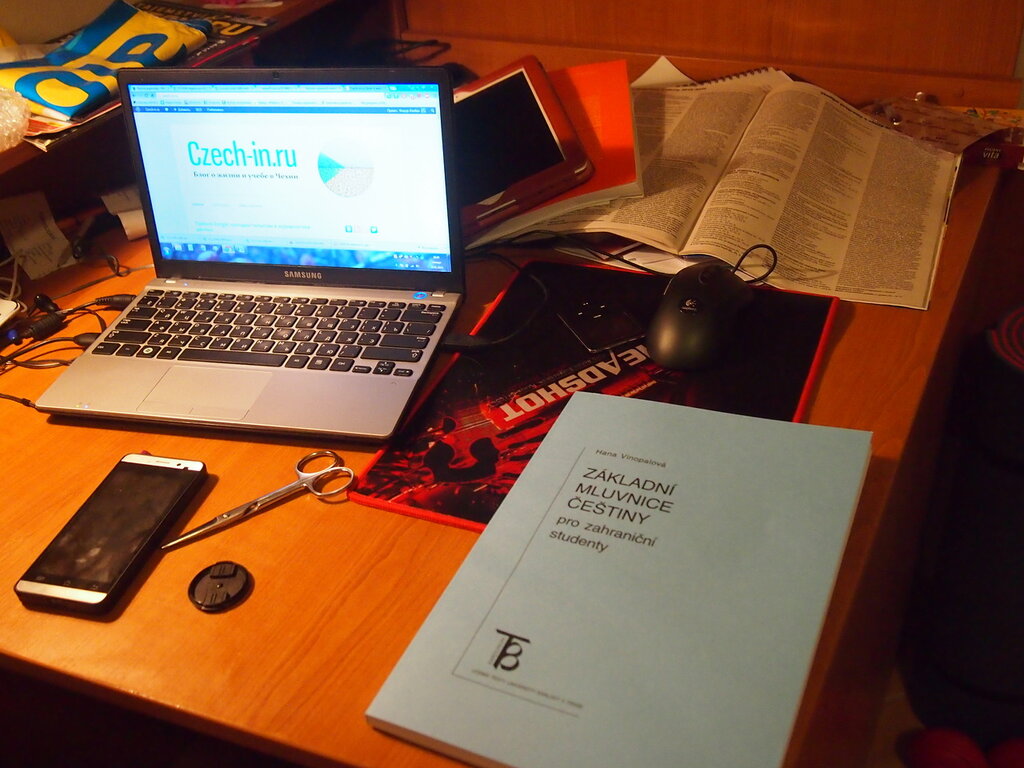
Credits and exams
Humanities group
history
The credit was in the form of a test. The test consisted of 30 questions, each with 4 answer options. Non-Russian-speaking students wrote a test of 20 questions. Yes, that's such racism.
Nothing unexpected, everything was in lectures, we repeated the material more than once. Personally, I wrote the test in about 3 minutes (although an hour was given for it) and got 100 points. It's worth noting that the Czech history course is not like the Russian history course, so all knowledge is new. The minimum you need to get is 60 points, this is a Russian "C".
introduction to specialty
Also credit in the form of a test. The test had 20 general questions on literature, 10 questions on books read, 10 questions on film history.
The test was quite easy, again, we reviewed almost everything in advance. I made mistakes in three questions, got 94 points. All material is also absolutely new, personally I didn't know anything in advance and couldn't know. You needed to score at least 60 points.
Czech language
This was no longer a credit, but an exam. It consisted of two parts, written and oral.
Both parts took place on different days. First we came on Monday. At 9 am we entered the classroom and started writing. The written part in turn was divided into 4 more parts: reading, grammar, listening and writing.
In reading you had to read texts and answer questions about them. In grammar - easy tasks, mainly - put the word in the correct form.
Then there was listening - we listened to a couple of dialogues and monologues, answered questions about them.
The last part was writing - you had to write an essay of 120 words on one of two topics: going to a restaurant or summer holidays. Students made the most mistakes in this part.
The second part was on Thursday. Students were distributed in advance by queue, everyone knew what time to come. 15 minutes were allocated for each student. It so happened that I was the very first, came at 8:30. In the oral part there were several tasks - answer questions about yourself, describe a picture, react to phrases in dialogue, imagine yourself in some situation (I, for example, had to rent an apartment).
At the end of the oral part they showed us our written works, you could check them. I found one mistake in the checking, it was immediately corrected. Most students passed the oral exam well.
Each part was evaluated at a maximum of 20 points. I got 94 again, made the most mistakes in writing. The minimum threshold is 60 points. Almost all Russian-speaking students successfully passed, foreigners had worse results, on the verge of possible.
Personally, I set the bar at 90% for myself, for a humanities student the worst result is a very bad sign. For a technical student I would set the threshold at 80% - this is enough to minimally understand and speak. In any case, everything below these scores is very bad, especially for Russian-speaking students, from whom the demand is higher than from others.
Technical (construction) group
mathematics
There were 10 problems, each worth 10 points. Of them - 2 word problems, 1 on geometry, everything else - equations, inequalities, parametric tasks. Overall - all from school curriculum, quite easy. Dasha got 92 points, needed to score at least 60.
physics
There were 5 problems. Topics - mechanics, Newton's laws, moments of force, Archimedes' law, addition of forces. Dasha solved 4 out of 5 and scored 80%. Minimum - 60.
Czech language
Was exactly the same as mine, only took it a day later. Got 85 points, minimum - 60, the rest - bad.
Here it should be noted that all future masters and doctoral candidates had a chance in the second semester to move to master's groups, which would mean that instead of additional subjects there would be English.
The condition for moving to the master's group was passing an English language test and successfully passing additional subjects (which this year turned out to be a difficult task, most students managed to fail these tests).
We wrote the English test, I scored 51 points out of 55, and Dasha - around 30. But I refused to move to the master's group, and Dasha - went. It's worth going to the master's group for those who need to improve English, those who don't need it - it's better to stay learning additional subjects, you can study vocabulary. In English I would just sit around doing nothing.
PS humanities master's group studies in Prague - moving in the middle of the year is not comme il faut.
Beginning of new semester
Humanities group
I started the new semester in a new classroom. By the way, now we've returned to our foreigners again and now study together. Of course, studying with them is much slower. They still speak Czech very poorly, don't really do homework, are late for classes. It's funny to realize that most of such foreigners are scholarship recipients.
Immediately you could see changes in the schedule - now we have less Czech and more additional subjects. First, now we'll have a class where we'll prepare for entrance exams. Second, we have a new subject - basics of Czech grammar.
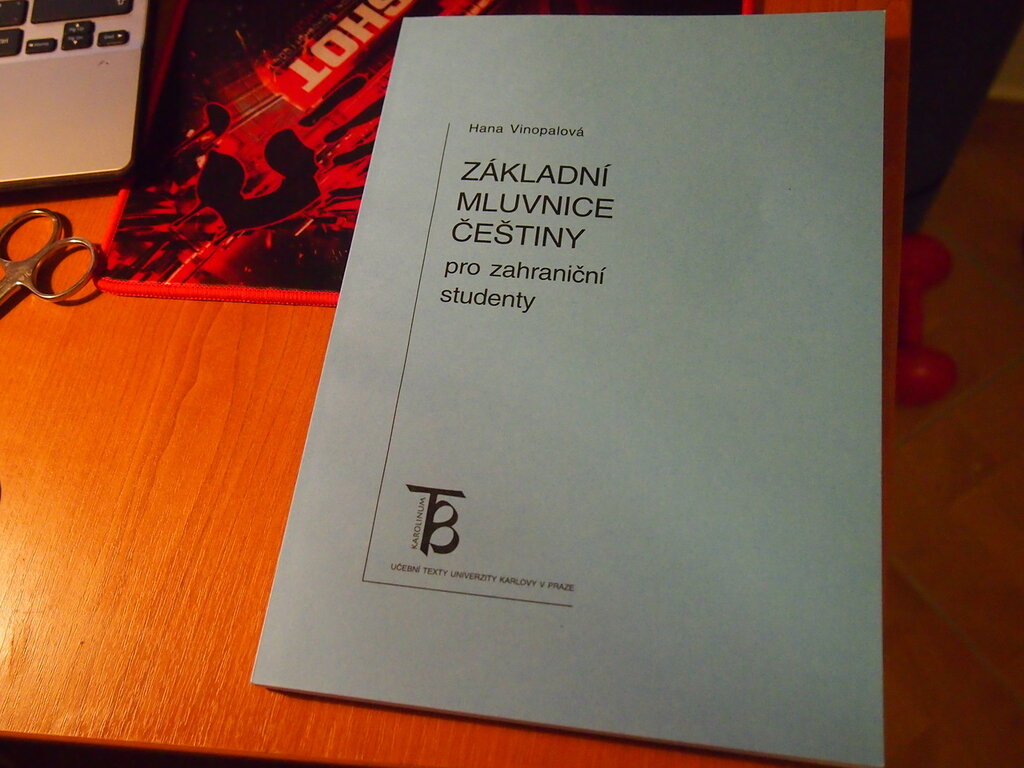
Here's such a textbook, typical for courses. Charles University publishing house. So far we're just learning definitions, quite boring, I hope it will be more interesting later.
Also now the film lesson goes longer - 3 academic hours instead of two, so there's an opportunity to watch a full film.
We also got new Czech language textbooks.
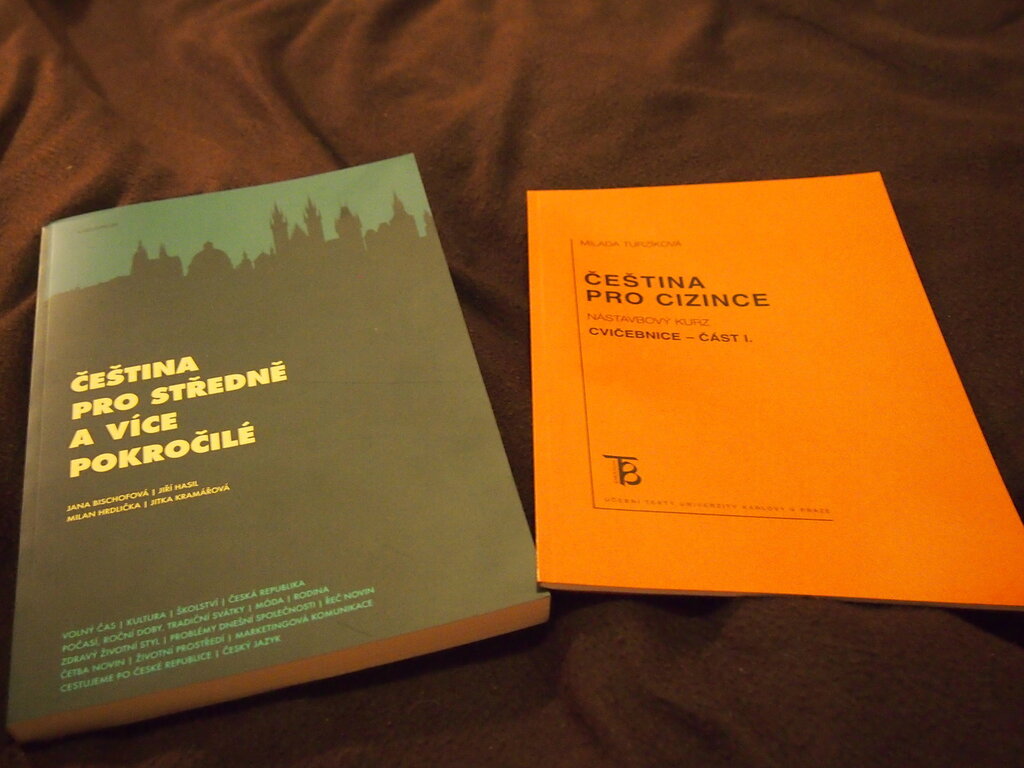
The textbook is quality, seems interesting.
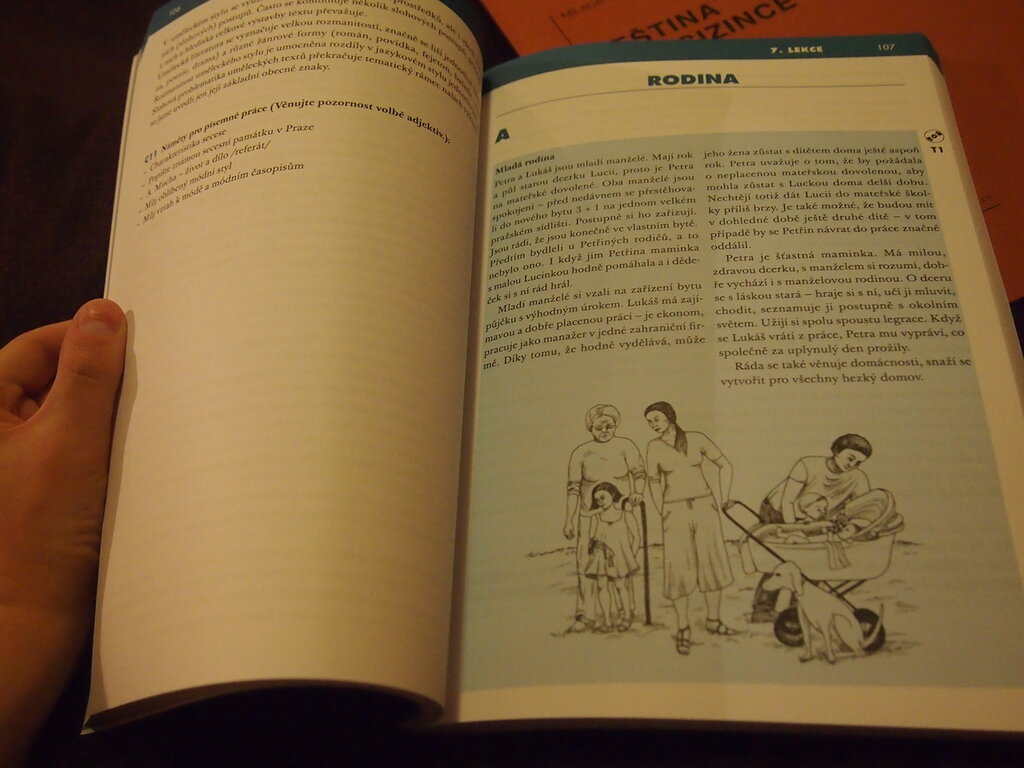
As always, typically scary pictures :)
And this is all for now, there are no more changes in the humanities group. Very soon we'll be sending applications to universities. Good students have already chosen where they'll apply, are closely preparing for exactly those exams they'll take. Bad students have very little time left to think - applications for bachelor's specialties can only be sent until February 28th. Among humanities students, Charles and Masaryk universities are popular.
Technical master's group
Dasha has everything more interesting. First, people are mainly older, which means - less screaming, talking, more work.
Second, now she doesn't study either physics or mathematics. Emphasis is on languages. This is not surprising, while future bachelors will take entrance exams in their specialties, future masters and doctors - will mainly go for interviews. By the way, many technical students will get into university without any exams at all - if the diploma has good grades (up to B average), getting in is not a problem, you can submit a request and not take entrance exams. Humanities students have such a chance extremely rarely :)
Now studying lasts only 30 hours a week - 20 Czech and 10 English.
Czech is studied from the same textbooks as mine, but they also gave a couple more.
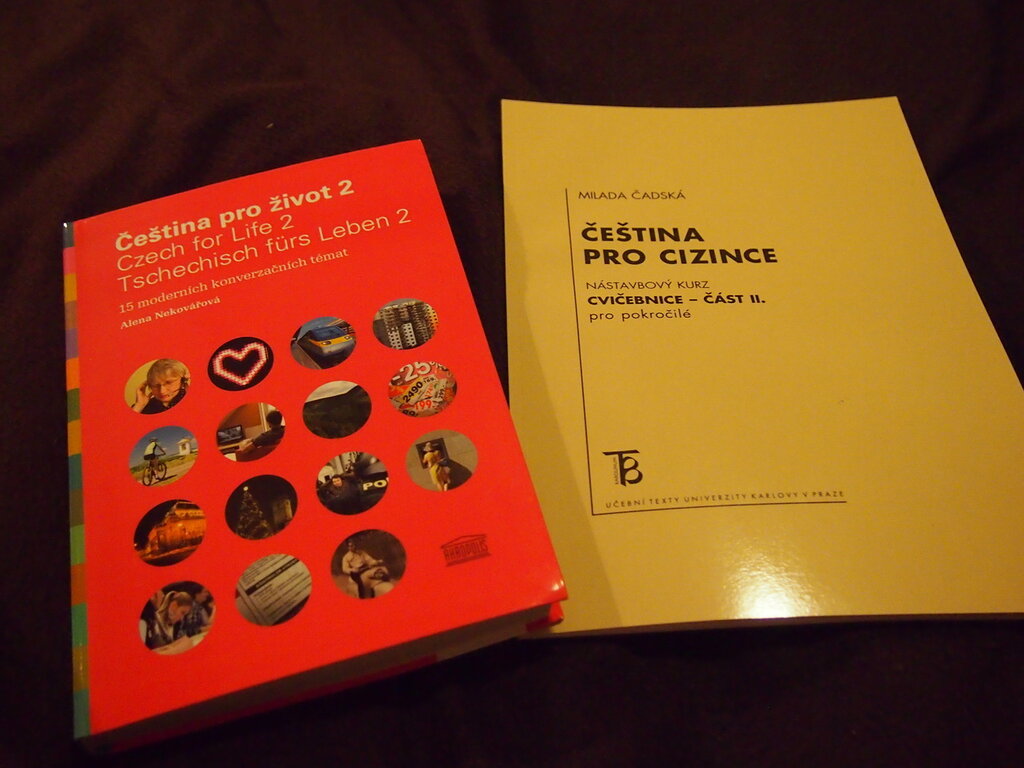
The first one is quite good, colorful, as you can see - it has 15 topics for discussion. By the way, the information inside is in 2 languages - German and English. Strangely enough, there's a version with French and Russian - but students were given exactly these (which is correct, in your native language you can read books at home).
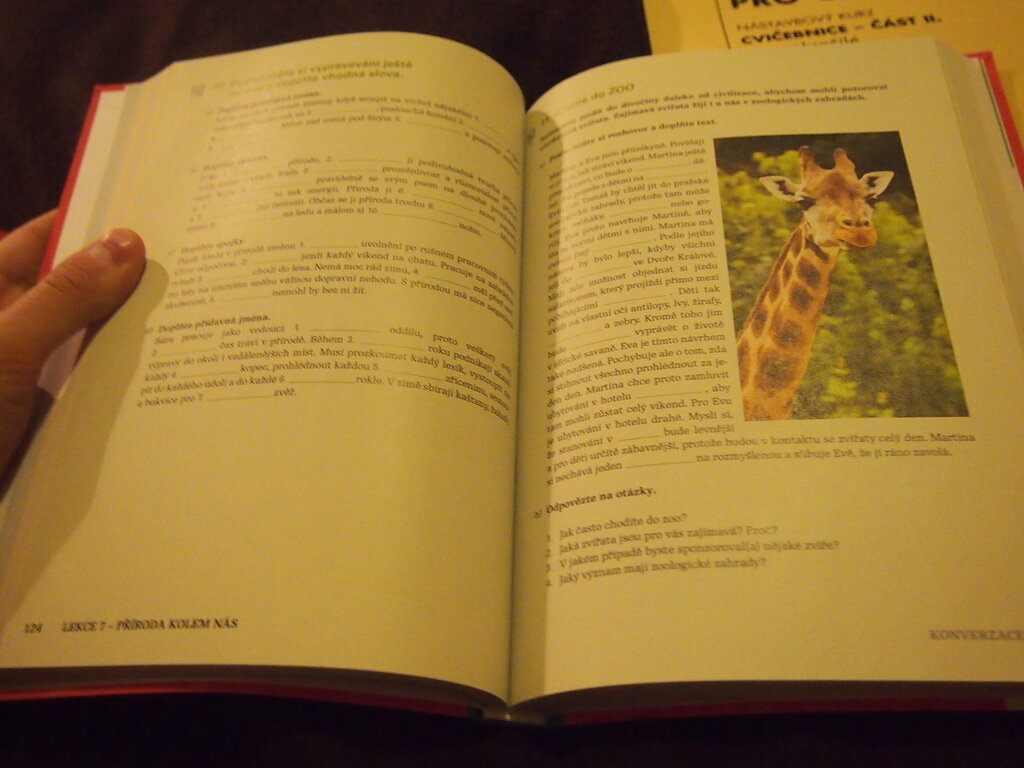
Typical spread - text with pictures.
A Czech textbook specifically for technical groups was also issued. Since technical students don't particularly get into languages, believing that they already know everything very well (I hear from every second technical student tales about how languages are very easy, that everyone knows English, but proving this by deed, not word, few succeed), and humanities students don't get into technical sciences because they think it's unrealistically hard (although in practice you just need to start) - there's no one to write textbooks. That's exactly why technical students have to study from antediluvian textbooks from 1988.
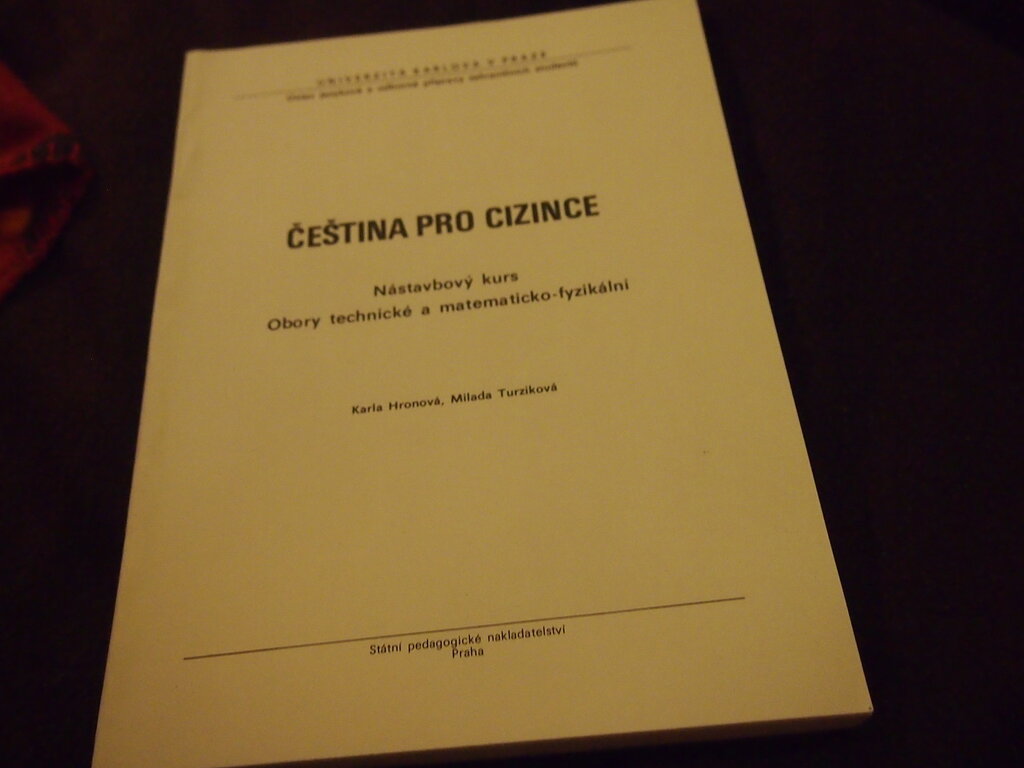
Unfortunately, the vocabulary there is quite outdated, but - beggars can't be choosers.
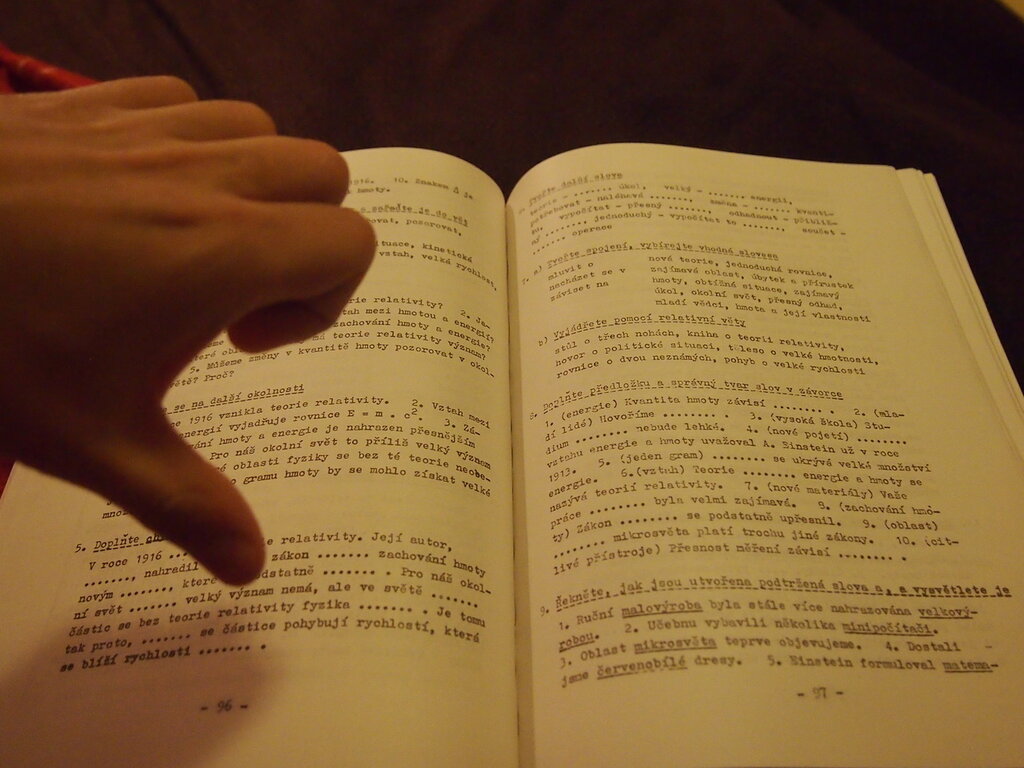
Printed, by the way, on a typewriter - eyes hurt :)
With English everything is controversial - it turned out that test results don't really affect anything. Everyone sits together anyway, both those who know well and those who don't at all. To learn, of course, in such an environment won't really work, but - we'll see.
In any case - textbooks are good, for students with a high level of language.
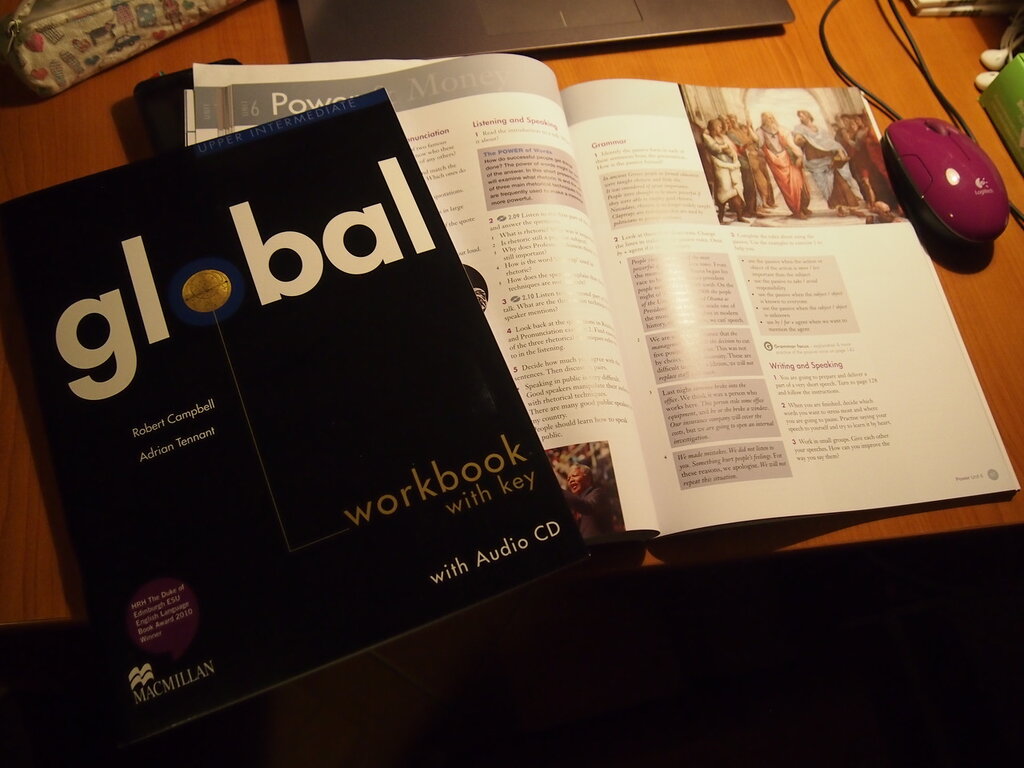
Printing is traditionally quality, tasks are well-developed, vocabulary is modern. Yes, fortunately, English is not Czech, there are people to write textbooks. You need to learn the language, after all, all work should be written in it.
Conclusions
Well - for now everything is going its own way. Students are again attending classes after a long break - from the end of December to mid-January the atmosphere was not at all academic - some didn't come, some celebrated. Now everything has again fallen into the right tracks.
Still, semester tests turned out to be more of a formality - it seems no conclusions followed from them. I believe that based on test results, groups should have been re-divided - why should those who study well waste time with those who do nothing at all. After all, it's exactly competition that gives motivation to improve. We'll see, of course, what will be ahead - but it seems that some details could be more effective. Now you should concentrate on studies - we have new teachers, need to get used to speech, to the new system. Any day now we'll be submitting applications and will plunge into exam preparation - there will be less and less time.
PS snow, still, fell. Just somewhere on Monday, in the twenties of January. In Russia at that time - -20 degrees. I remember how in ten sweaters at the same time I walked on foot for half an hour from the institute to the metro, and I don't want to be lazy :)